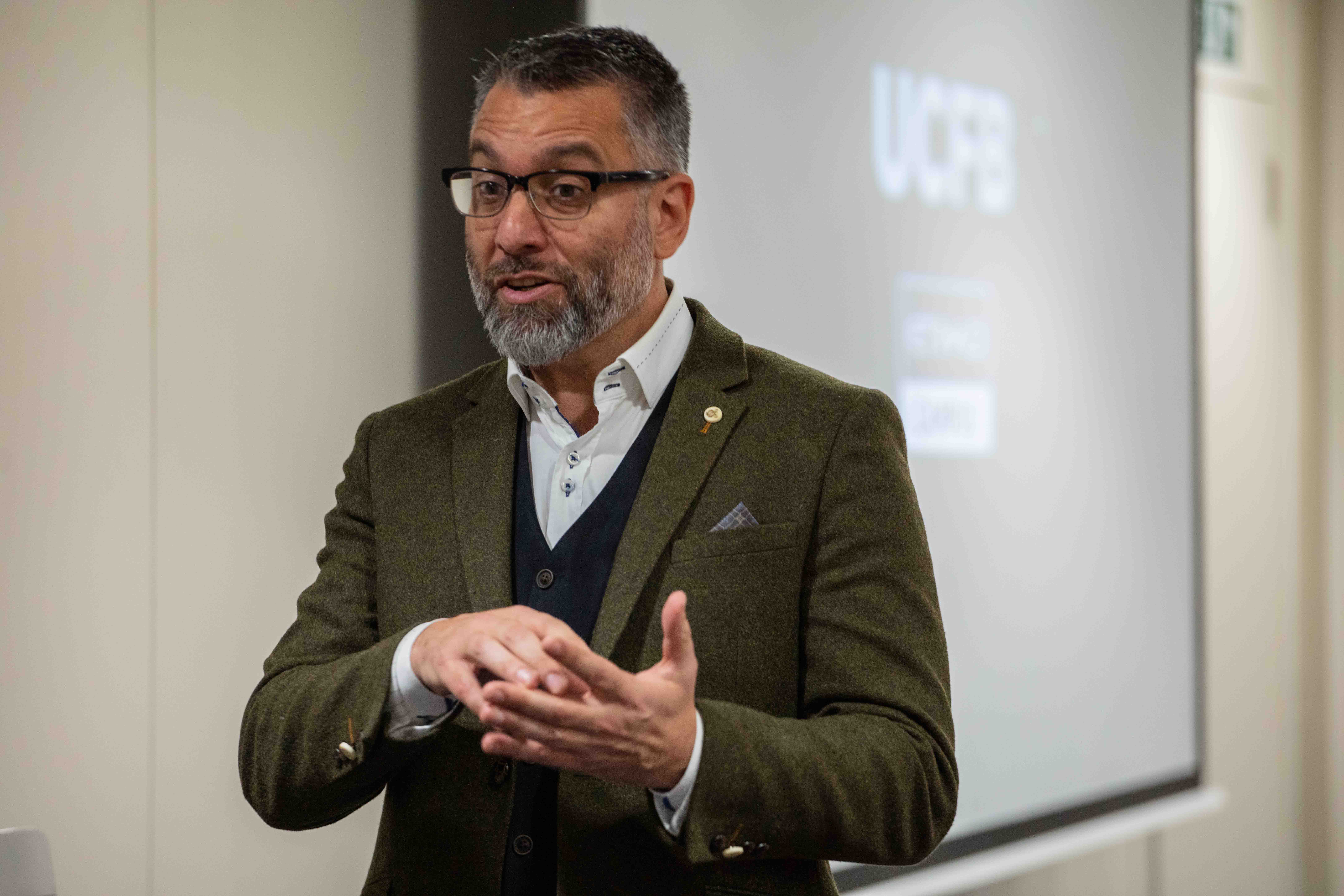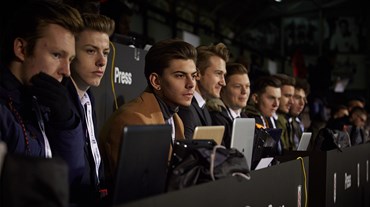The ultimate guide for graduates in choosing your ideal career in the sports journalism industry.
The sports industry, and the media that surrounds it, is moving at such an incredible pace. More jobs and opportunities are available than ever before.
The media landscape has changed almost beyond recognition in recent years following a digital revolution which has paved the way for a 24-hour rolling news agenda. In that time, sports journalism has also developed to become the fastest growing sector in UK media.
Traditional print and broadcast sports journalism, while still powerful communications platforms, are being forced to adapt and change in order to survive in a new and rapidly-developing media environment. As a result, sports journalists are now expected to develop a range of digital and social media skills which enable them to tell a story across a number of platforms in order to reach a wider, often global, audience.

Chief Sports Reporter
The chief sports reporter will help dictate the news agenda online, in-print and on-screen. They lead the team and land big scoops. As the go-to sports reporter at the organisation, they set the standard and no everybody at every club and organisation in the local area. A chief sports reporter at regional level will go on to national level should they have the desire and ambition to cover all sports to an advanced and consistent standard.
Chief Sports Reporter degree courses
- BA (Hons) Multimedia Sports Journalism
- BA (Hons) Sports Business & Sports Broadcasting
- BA (Hons) Football Business and Media
- BA (Hons) Football Business and Marketing
- MSc Football Communications & Digital Marketing
Press Officer
A press officer is the last line of defence for a brand and a club, staving off bad news and producing good. They’ll ensure positive press is created and set the news agenda within their organisation. If a media outlet wants access to an athlete, they must go through the press officer. A good press officer in the football and sports industry will have a thorough understanding of their sport, the people that operate within it and how to spin a headline. They’ll also be an astute communicator, whether written word or on camera.
Press Officer degree courses
- BA (Hons) Multimedia Sports Journalism
- BA (Hons) Sports Business & Sports Broadcasting
- BA (Hons) Football Business and Media
- BA (Hons) Football Business and Marketing
- MSc Football Communications & Digital Marketing
Regional Newspaper Reporter
Regional press may be going through a testing time right now, but sports desks in newsroom across the country have never been busier. Every town in the UK has a number of sports clubs to keep on top of, professional and amateur, and a regional reporter will be expected to know everything about anything. Match reports, live blogs, interviews and social media work is just your average day in the job. No one knows Manchester United better than the Manchester Evening News sports team, just as no one knows Plymouth Argyle better than the Plymouth Herald sports team. Regional sports reporters matter and are full of exclusives.
Regional Newspaper Reporter degree courses

Club Content Producer
The 21st century has seen sports clubs and organisations really make use of the internet and the ability to speak to their fans on a direct basis. Because of this, content producers are now more and more common across these organisations. Content is consistently needed for the website, match day programmes, marketing material, video channels and more. The need for imaginative and able writers for these channels is ever growing. Written content will range from player interviews and club announcements to feature and historical pieces. More and more fans are now going direct to the club for their news, making this role a vital cog in the sports media machinery.
Club Content Producer degree courses
- BA (Hons) Multimedia Sports Journalism
- BA (Hons) Sports Business & Sports Broadcasting
- BA (Hons) Football Business and Media
- BA (Hons) Football Business and Marketing
- MSc Football Communications & Digital Marketing
Social Media Executive
Facebook, Twitter, and Instagram now dominate popular culture, with large swathes of the world’s population having online profiles. It’s also a tool which all types of businesses can use any time of day to push their message and sell their product. Sports clubs and organisations have dedicated teams manning these channels and responding to thousands of interactions with their fans and the public each day. Real Madrid have 30 million followers on Twitter, and Barcelona have 103 million followers on Facebook. These platforms offer incredible reach for clubs to access their fans and find out what works for them as an organisation. A social media executive will pose questions, understand the mood of social media, what fans want to read and watch and engage with audiences around the world. And of course, the crowning glory of any social media professional… for their content to go viral.
Social Media Executive degree courses
- BA (Hons) Multimedia Sports Journalism
- BA (Hons) Sports Business & Sports Broadcasting
- BA (Hons) Football Business and Media
- BA (Hons) Football Business and Marketing
- MSc Football Communications & Digital Marketing
Photographer
Photographers are at the forefront of history. Their images help a moment transcend time and generations, educating for years to come. Professional sports photography is an art form and requires time and dedication, not to mention a brilliant eye for detail and capturing pure emotion. An image can be shared around the world and seen by hundreds of millions of people. Photographers can see what others can’t, and an image can be captured, edited, uploaded and then published all within minutes from some of the world’s leading sports tournaments. Being able to work around Photoshop and similar editing software is a must.
Photographer degree courses
- BA (Hons) Multimedia Sports Journalism
- BA (Hons) Sports Business & Sports Broadcasting
- BA (Hons) Football Business and Media
- BA (Hons) Football Business and Marketing
- MSc Football Communications & Digital Marketing
Radio Host
Those who claim radio broadcasting is a dying art clearly don’t listen to the likes of BBC Five Live and TalkSport. Whether it’s matchday commentary, live event coverage, news reports, interviews or the consistently fun fan phone-ins, radio covers a huge range of journalistic skills. Much like a TV presenter, a radio host will be expected to know how to package a story, source the best quotes and challenge interviewees live on air under immense pressure. UCFB students have previously gained work experience at the likes of BBC Five Live and TalkSport to further expand their knowledge.
Radio Host degree courses

Sub-editor
A sub-editor is the last line of defence for language – you’ll check the writers’ grammar and sense check the article. A sub will go back to their reporter and ask for further details on the story, a missing quote, some added colour, before then carefully designing the page – paper or digital – and laying the words and pictures onto it. A lot of sub-editors are trained journalists who have moved jobs after years of service. They know a good story when they read it, so don’t be offended when they ask you for further details.
Sub-editor degree courses
- BA (Hons) Multimedia Sports Journalism
- BA (Hons) Sports Business & Sports Broadcasting
- BA (Hons) Football Business and Media
- MSc Football Communications & Digital Marketing
PR Executive
Do you enjoy networking, talking to and meeting people, and generally try to convey a positive message? Then PR could be for you. A PR executive’s role is to manage the information between organisations, known as B2B (business to business), or from organisations, in this case, a club or governing body, to the press and general public. An effective PR executive will generate positive news for the organisation and have in place across the various forms of media, whether print, digital or broadcast. Another vital part of the job is keeping on top of daily news to see where your organisation is being published. If it’s a negative story, how do you spin it in your favour? The world’s biggest football clubs like Bayern Munich and Barcelona, and the world’s biggest brands like Nike and Adidas, all employ a huge army of PR professionals, ensuring they’re always in the headlines for what happens off the pitch as well as on it.
PR Executive degree courses
- BA (Hons) Multimedia Sports Journalism
- BA (Hons) Sports Business & Sports Broadcasting
- BA (Hons) Football Business and Media
- BA (Hons) Football Business and Marketing
- MSc Football Communications & Digital Marketing
Website Editor
The internet is the first port of call for breaking news and an organisations biggest tool to promote itself with. A clean, easy to use website full of engaging content is key to a sports club or organisation sending out a clear and consistent message. A website editor will know what content works for their company, will measure engagement and page views to analyse the best performing content and ensure the correct information is portrayed to the public.














